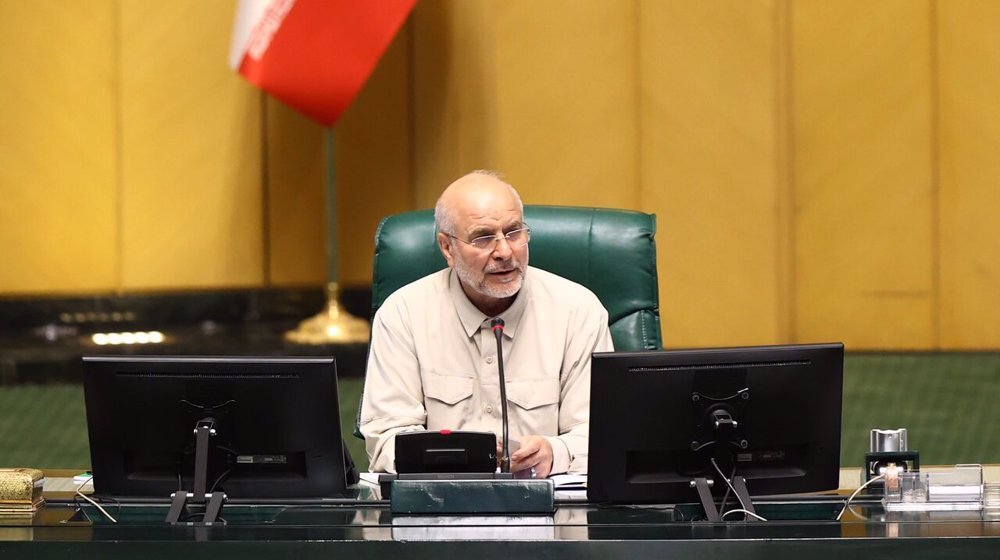Iran parliament speaker hails Russia, China for rejecting ‘snapback’

TEHRAN – In a Saturday open parliamentary session held in Tehran, Parliament Speaker Mohammad Baqer Qalibaf characterized a joint letter from Iran, Russia, and China to the United Nations as a clear manifestation of the "strategic solidarity" between the three nations.
The letter, which protests a European initiative to reimpose pre-JCPOA UN sanctions on Iran, was delivered to the UN Secretary-General and the President of the Security Council. Qalibaf described this diplomatic achievement as a significant outcome of Iran's foreign policy, attributing it to the enduring resilience and advancement of the Iranian people in confronting years of unfair pressures and international sanctions.
“A letter by the foreign ministers of the Islamic Republic of Iran, the Russian Federation and the People’s Republic of China to the secretary general of the United Nations and the president of the United Nations’ Security Council symbolizes strategic solidarity between these three major powers, which announced loud and clear that the move by the three European countries to activate the so-called ‘snapback mechanism’ basically lacks any legal foundation,” said the top legislator.
The jointly signed document from the three foreign ministries stands as a symbol of the alignment among their countries. It explicitly states that the attempts by three European states—the United Kingdom, Germany, and France, collectively known as the E3—to trigger the snapback mechanism are without any legal foundation.
The core of the letter affirms that October 18, 2023, marked the official termination of UN Security Council Resolution 2231. This resolution was the document that originally endorsed the 2015 nuclear agreement, from which the United States unilaterally withdrew. Consequently, with the expiry of this resolution, the three allies assert that the Iranian nuclear dossier is no longer a matter for the Security Council's agenda.
The E3 had initiated the 30-day snapback process on August 28, a move that Tehran immediately rejected as illegitimate. Iran's position is that since the United States abandoned the Joint Comprehensive Plan of Action (JCPOA) in 2018, it has no legal standing to invoke provisions of the deal. Furthermore, Iran contends that the E3’s alignment with Washington’s unlawful sanctions campaign further invalidates their position.
Despite assertions from the U.S. and its European partners in late September that UN sanctions on Iran were reinstated, the tripartite letter from Iran, Russia, and China insists that such a procedure is fundamentally flawed from both legal and procedural perspectives.
Qalibaf elaborated that, according to Paragraph 8 of the now-expired Resolution 2231, all restrictions and provisions within the document have legally concluded. “Under Clause 8 of [UNSC] Resolution 2231, all the restrictions and obligations in this resolution have ended, the annulment of all previous resolutions will remain in place and, with the recognition of [Iran’s] official right to enrichment, Iran’s nuclear dossier has now been removed from the UN Security Council’s agenda,” he emphasized.
In a related diplomatic move, Qalibaf also referenced a separate communication sent by the ambassadors of China, Iran, and Russia to the Director General of the International Atomic Energy Agency (IAEA), Rafael Mariano Grossi. This letter clarified that with the termination of Resolution 2231, the mandate given to the IAEA head for reporting on the verification and monitoring of Iran’s nuclear activities has also officially ended.
As a result, Qalibaf stated, the IAEA is now legally obligated to operate under the framework of its Board of Governors' decision from December 2015. That decision authorized verification activities for a maximum of ten years, or until the agency could issue a broader conclusion on Iran's nuclear program, whichever occurred first. The parliament speaker insisted that the IAEA must adhere to this specific mandate rather than yielding to the unilateral interpretations promoted by Western nations. He declared that these two joint letters represent not merely a legal triumph for Iran but also serve as powerful evidence of a changing global power dynamic.
Qalibaf further commended the Non-Aligned Movement (NAM) for its member states' declaration of support for Iran on the snapback issue. “From a legal standpoint, a coalition comprising China, Russia, Iran, and the 120 member states of NAM has effectively halted the misuse of international organizations' frameworks,” he said. This collective action, Qalibaf concluded, will undoubtedly play a crucial role in mitigating the impact and effectiveness of sanctions against the Islamic Republic of Iran.
Leave a Comment